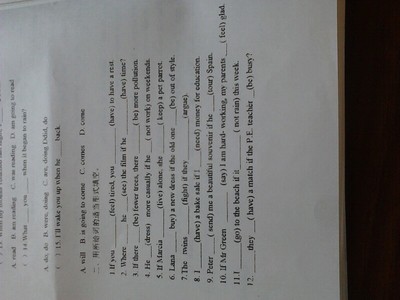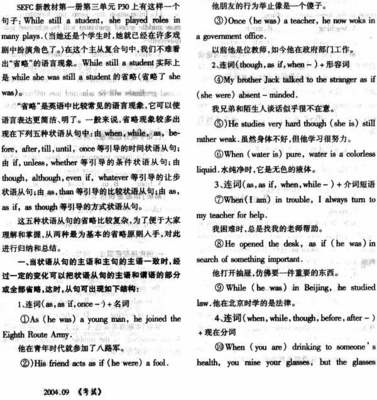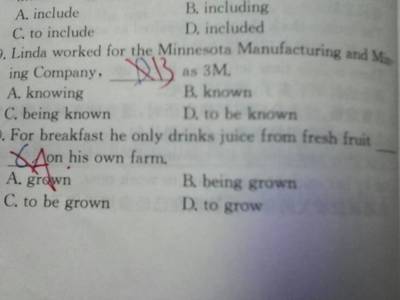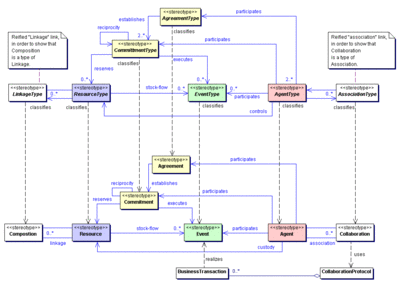时间状语从句
一.时间状语从句常用引导词
when,while,as,before,after,until,till,since,
immediately,directly,instantly,assoonas,themoment,
everytime,eachtime,
hardly…when…,nosooner…than…
三.重点,难点,考点
1.while“与……同时,在……期间,趁着”,从句动作是延续性的,侧重主句动作与从句相对比。
Eg.1.Whilehewasreading,hiswifewascooking.
2.Theyrushedinwhilewewerediscussing.
3.Striketheironwhileitishot.趁热打铁。
日常总结:1.while引导的从句常用进行时态。
2.通常主从句的主语不同。
3.while还可以表示“虽然,尽管”,引导让步状语从句,多放在句首。WhileIadmithisgoodpoints,Icanseehisbad.
尽管我承认他有优点,我也知道他有缺点。
2.when除了“当……时候”讲,还可译为“这时,那时”,相当于andatthis/thattime,强调动作的突然性
常用句式有:beabouttodo…when…
bedoing…when…
beonthepointofdoing…when…
译为“正要……时突然……”
…haddone…when…
“还没/刚刚……就……”
Itbe+时间点+when…
当……时是……时间
Eg.Wewereabouttoleavewhenitbegantorain.
Hewasabouttotellmethesecretwhensomeonepattedhimontheshoulder.
IhadnotbeenreadingforhalfanhourwhenIheardstepsoutside.
Itwas8:00intheeveningwhenhewentbackfromwork.
3.As“一边…一边…”“随着…”主从句主语常相同
Eg.Asshesang,tearsrandownhercheeks.
Wegetwiseraswegetolder.
我们随着年龄的增长而变得聪明起来。
4.before“在…之前,才,就,不等…就……,还没来得及……就……”
Eg.TheringstoppedbeforeIcouldanswerthephone
我还没来得及接电话,电话铃就停了。
常用句式:
Itwas+一段时间+before+从句“过了多久才……”
Itwasn’t+一段时间+before+从句“没过多久就……”
Itwillbe+一段时间+before+从句“要过多久才……”
Itwon’tbe+一段时间+before+从句“不用过多久就会…”
Eg.Itwastwoyearsbeforewemetagain.
又过了两年我们才再次相见。
Itwasn’ttwoyearsbeforewemetagain.
相隔没到两年我们就又见面了。
Itwillbelongbeforewemeetagain.
要过很长时间我们才能再见面。
Itwon’tbelongbeforewemeetagain.
不用过很长时间我们就又能见面了。
5.until和till的用法
1)用于肯定句中,主句常用延续性动词
Iwaitedtill/untilhearrived.
2)否定式not…until…“直到……才……”,until后可接表时间的短语或从句。
Hedidn’gohomeuntilhefinishedhiswork/midnight.
3)notuntil表示强调,放于句首时,主句要部分倒装
Notuntilhefinishedhisworkdidhegohome.
我昨晚直到半夜才上床睡觉。
Ididn’tgotobeduntilmidnightlastnight.
NotuntilmidnightlastnightdidIgotobed.
4)notuntil在强调句中的应用:Itis/wasnotuntil…that…
ItwasnotuntilmidnightthatIwenttobedlastnight.
6.since常用句式
Itis/hasbeen+一段时间+since+从句(谓语一般过去时)
1)从句谓语是延续性动词,则译为“自从不做某事已经多长时间了”
Itis/hasbeentwoyearssincehesmoked.
他已有两年不抽烟了。
2)从句谓语是非延续性动词,则译为“自从做某事已经多长时间了”
他去世已有两年了。
Itis/hasbeentwoyearssincehedied.
7.It/This/Thatis+the+序数词+time+(that)+sb.havedone…
It/This/Thatwas+the+序数词+time+(that)+sb.haddone…
某人第几次做某事
Eg.这是我第一次读这个故事。
ItisthefirsttimethatIhavereadthisstory.
☻thefirsttime和forthefirsttime的区别
Hemetwithherforthefirsttime.(在句中只做时间状语)
他第一次遇见她。
Hefellinlovewithherthefirsttimehemetwithher.(起到连词的作用,引导从句)
他第一次遇见她就爱上了她。
ThefirsttimeIsawhim,hewasrepairinghiscar.
8.“一……就……”的表达法
assoonas,immediately,directly,instantly,themoment,theminute,thesecond,theinstant,nosooner…than…,hardly/scarcely…when…
Eg.Hestartedhissearchthemomenthereachedthecountry.
他一到那个国家就开始了他的搜寻工作。
他一写完作业就去看电视了。
HestartedtowatchTVassoonas/immediately/directly/instantly/themoment/theminute/thesecond/theinstanthefinishedhishomework.
hardly/scarcely…when…;nosooner…than…一……就……
1).必须记住相应的搭配。
2).hardly/scarcely和nosooner所在的句子是主句,而when和than引导的是从句,谓语动词用一般过去时。
when和than引导的从句不能放在主句之前。
3).句式:Sth./Sb.hadnosoonerdonesth.thansb.didsth.
Sth./Sb.hadhardlydonesth.whensb.didsth.
Sth./Sb.hadscarcelydonesth.whensb.didsth.
Eg.Ihadnosooneropenedthedoorthanherushedout.
Hehadhardly/scarcelyseenthepolicemanwhenheranaway.
4).当hardly/scarcely和nosooner提到句首时,紧跟其后的从句用部分倒装。Nosoonerhadsth./sb.done…than…did….
Hardlyhadsth./sb.done…when…did….
Scarcelyhadsth./sb.done…when…did….
例如:
Ihadnosooneropenedthedoorthanherushedout.
=Ihadhardlyopenedthedoorwhenherushedout.
=HardlyhadIopenedthedoorwhenherushedout.
=NosoonerhadIopenedthedoorthanherushedout.
=AssoonasIopenedthedoorherushedout.
=HerushedoutassoonasIopenedthedoor.
9.everytime,eachtime,nexttime,anytime,thefirsttime,allthetime等名词性短语可以用来引导时间状语从句,表示“每次,下次,任何时候,第一次…”等。
Eg.Nexttimeyoucome,doremembertobringyoursonhere.
下次来这时,记得带上你儿子。
每次他高兴时就会唱起歌来。
Hewillsingeverytimeheishappy.
时间状语从句专项练习
I.Choosethebestanswer.
1.Ilearntherhard-workingandkind_______Igottoknowherinthebookstore.
A.firsttimeB.forthefirsttime
C.thefirsttimeD.bythefirsttime
2.Itwasnot_______hetookoffhisdarkglass____Irealisewhohewas.
A.when;thatB.until;when
C.when;thenD.until;that
3.Itwas19years_______Mandela,theformerpresidentofSouthAfrica,wassetfreefromprison.
A.beforeB.sinceC.untilD.that
4._______hadthebellrung_______thestudentstooktheirseats.
A.Hardly;whenB.Nosooner;when
C.Hardly;thanD.Nosooner;then
5.Wewalkedalongthebeachfornearlythreehours_______wesawaboatonthesea.
A.whenB.beforeC.unlessD.until
6.Thetwobrothersquarreledandquarreled_______theyfeltsleepyandwenttobed.
A.whenB.beforeC.unlessD.until
7.Itwasquitealongtime_______Imadeitoutwhathadhappened.
A.afterB.beforeC.whenD.since
8.WesenttheinjuredtotheFirst-aidCentre_______theaccidenthappened.
A.immediatelyB.hurriedly
C.quicklyD.shortly
II.Fillintheblankswithproperconjunctions.
2._______shegotthepay,sheputitawayinthebank.
3.Iwaswanderingthroughthestreet_______Icaughtsightofatailor’sshop.
4.Hewasdrinkingjuice_______therestofusdrankwhisky.
5_______youreadthepoemasecondtime,themeaningwillbecomeclearer
toyou.
6.Wewalkedalongtheseasideabouttwohours_______wecametoafisherman’svillage.
7.Thesailorstayedonthelonelyisland____ashippassedthereandsavedhim.
8.Itwaseightyears_______theChinesepeopledroveofftheJapaneseaggressors.
参考答案:
1—5CDAAB6—8DBA2.Assoonas3when4.while
5When6before7until8before
 爱华网
爱华网


